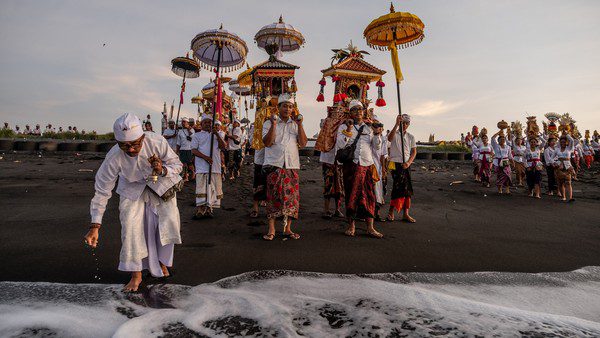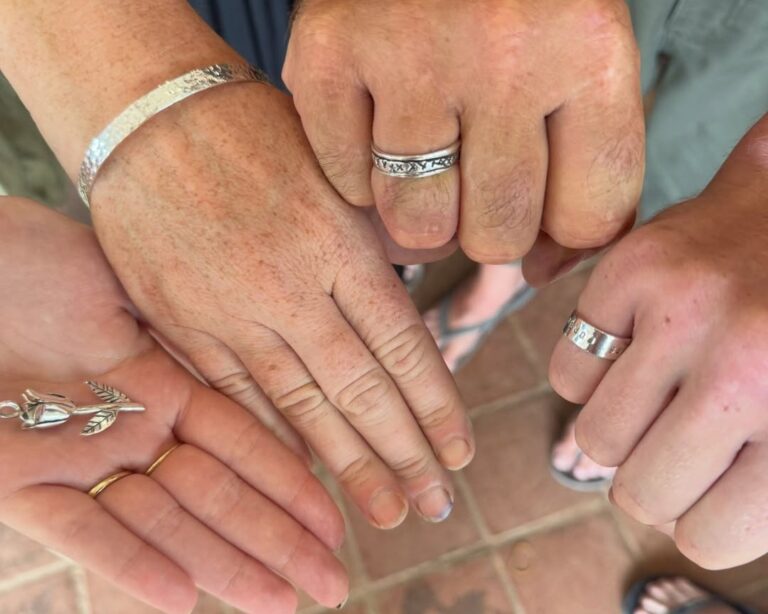Preparing for Nyepi in Bali: A Complete Guide for Tourists to Understand the Nyepi Day Traditions and Tips to Face This Unique Celebration.
Nyepi, also known as the Day of Silence, is the Balinese New Year celebrated according to the Saka calendar. On this day, the entire island enters a 24-hour period of complete silence, known as Hari Keheningan or the Day of Silence. For tourists planning to be in Bali during Nyepi, it is essential to understand this tradition and prepare accordingly.
Preparing for Nyepi: When is Nyepi Day?
Nyepi Day, also known as the Day of Silence, is the Balinese Hindu New Year celebrated according to the Saka calendar. The date of Nyepi varies each year based on this lunar calendar. In 2026, Nyepi Day falls on Thursday, March 19, 2026. The evening before, on Wednesday, March 18, 2026, Bali will hold the famous Ogoh-Ogoh parade, marking the beginning of the sacred celebration, has been designated as a public holiday to allow for preparations for the celebration.
Understanding the date of Nyepi Day is crucial for tourists planning to visit Bali. During this Day of Silence, all activities on the island come to a complete halt for 24 hours, including airport operations and transportation services. Tourists are expected to remain within their accommodations and respect the local traditions being observed.
What is Nyepi?
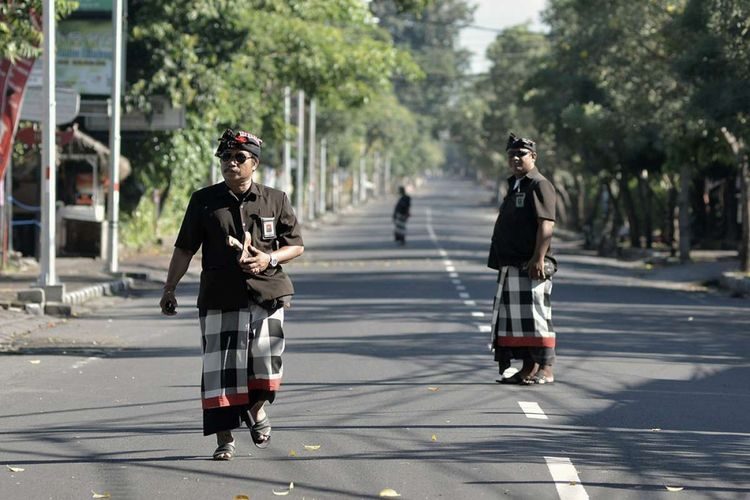
Image Source: kompasiana.com
Nyepi comes from the word “sepi”, which means silent or quiet. Nyepi Day marks the Balinese New Year in the Saka calendar, which began in 78 AD. Unlike the Gregorian New Year, which is celebrated with festivities and cheer, the Saka New Year in Bali begins with silence and self-reflection. The primary purpose of Nyepi is to seek blessings from Ida Sang Hyang Widhi Wasa (God Almighty) to purify both Bhuana Alit (the human realm/microcosm) and Bhuana Agung (the universe/macrocosm).
The Nyepi celebration is characterized by the practice of Catur Brata Penyepian, which consists of four main prohibitions observed for 24 hours:
- Amati Geni: Refraining from lighting fire or using lights, including electricity.
- Amati Karya: Abstaining from work or any physical activities.
- Amati Lelunganan: Prohibiting travel or leaving one’s home.
- Amati Lelanguan: Avoiding entertainment or pleasurable activities.
During this period, streets become deserted, the airport is closed, and all public activities are suspended. Tourists are expected to stay within their accommodations to respect the silence and spiritual reflection observed by the Balinese community.
Experiencing Nyepi in Bali offers a unique opportunity to understand and honor local traditions. With proper preparation, you can enjoy this peaceful moment comfortably and meaningfully.
Preparing for Nyepi: A Guide for Tourists
Nyepi, known as the Day of Silence, is a unique Balinese Hindu New Year celebration where the entire island observes 24 hours of complete silence and inactivity. For tourists planning to be in Bali during this period, proper preparation is essential to ensure comfort and to respect local traditions. Here are some steps to assist you in preparing for Nyepi:
Choose Accommodation with Adequate Amenities
Ensure your stay is at a hotel or villa that offers comprehensive facilities, such as 24-hour food service, entertainment options, and recreational areas. Many establishments provide special Nyepi packages, allowing guests to enjoy various amenities without leaving the premises. It’s advisable to check the hotel’s policies regarding Nyepi to ensure a comfortable stay.
Stock Up on Food and Beverages
All shops, restaurants, and delivery services cease operations during Nyepi. Therefore, it’s crucial to prepare sufficient food and drinks in advance. Consider purchasing snacks, ready-to-eat meals, or ingredients that can be easily prepared in your accommodation. Also, ensure an ample supply of drinking water.
Withdraw Sufficient Cash
ATMs and banks are closed during Nyepi. Make sure to have enough cash on hand to cover any immediate needs or payments at your accommodation.
Prepare Medications and Personal Essentials
Pharmacies and medical stores do not operate on Nyepi. Bring necessary personal medications and basic medical supplies to address any health needs. If you have specific medical conditions, consult your doctor before traveling and ensure you have an adequate supply of required medications.
Plan Indoor Activities
During Nyepi, tourists are expected to remain within their accommodation premises and avoid outdoor activities. Prepare books, board games, or download movies and music beforehand to keep yourself entertained. Some hotels may offer special programs or activities for guests during Nyepi.
Respect Local Customs and Regulations
On Nyepi, four main prohibitions, known as Catur Brata Penyepian, are observed: no lighting fires or using electricity, no working, no traveling, and no entertainment. Tourists are expected to minimize the use of lights and noise, respecting the silence maintained by the local community.
By thoroughly preparing for Nyepi, you not only ensure personal comfort but also demonstrate respect for Balinese culture and traditions. This experience offers a unique opportunity for self-reflection and to appreciate the serene beauty of the Island of the Gods.
Series of Activities on Nyepi Day
Nyepi Day is the Balinese Hindu New Year, marked by a series of sacred rituals. For tourists looking to start preparing for Nyepi, understanding these activities is crucial to honor local traditions and plan their visit properly. Here are the key stages of the Nyepi Day celebration:
Melasti (Purification Ceremony)
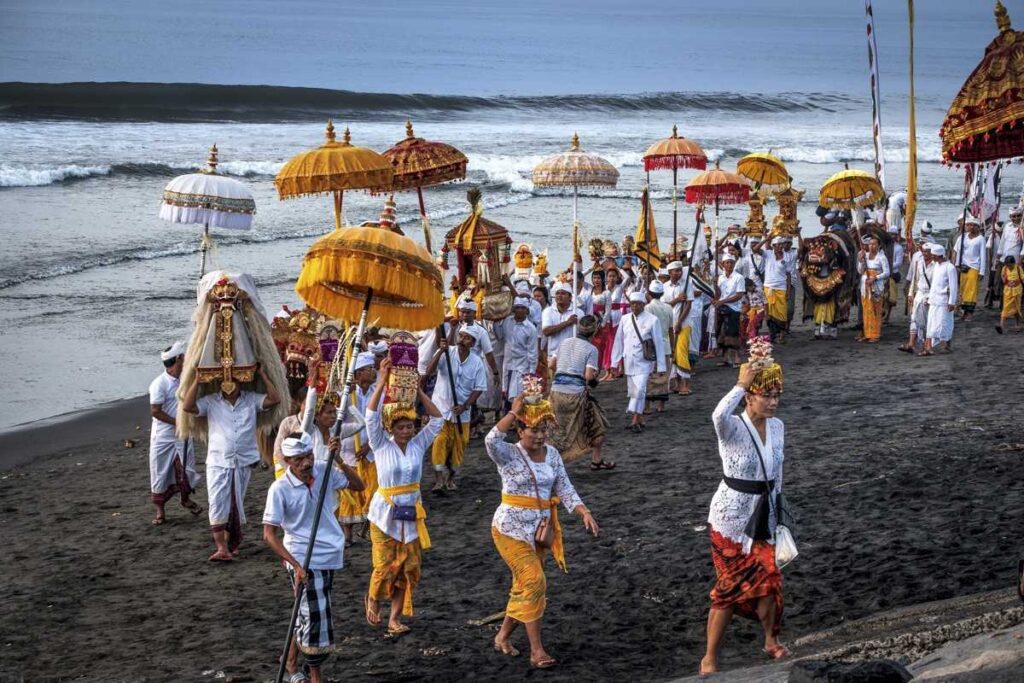
Image Source: goodnewsfromindonesia.idA few days before Nyepi, Balinese Hindus conduct the Melasti ceremony by going to the nearest water source, such as the sea, a lake, or a spring. The purpose of this ritual is to purify oneself and the environment from negative influences while praying for spiritual clarity as part of preparing for Nyepi.
Tawur Kesanga (Bhuta Yajna Ceremony)
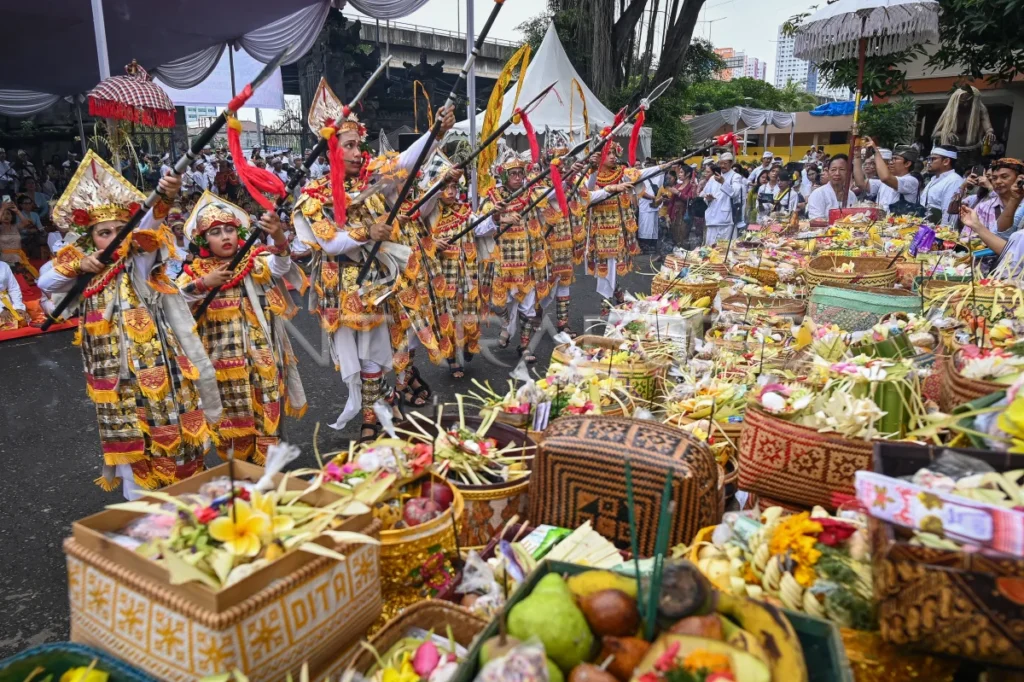
Image Source: antarafoto.comOne day before Nyepi, the Tawur Kesanga ceremony takes place at village intersections or temple courtyards. This ritual aims to balance the relationship between humans, nature, and the divine by offering symbolic sacrifices to Bhuta Kala, representing negative forces. It signifies the harmony required before entering the sacred day of silence.
Pengrupukan (Ogoh-Ogoh Parade)
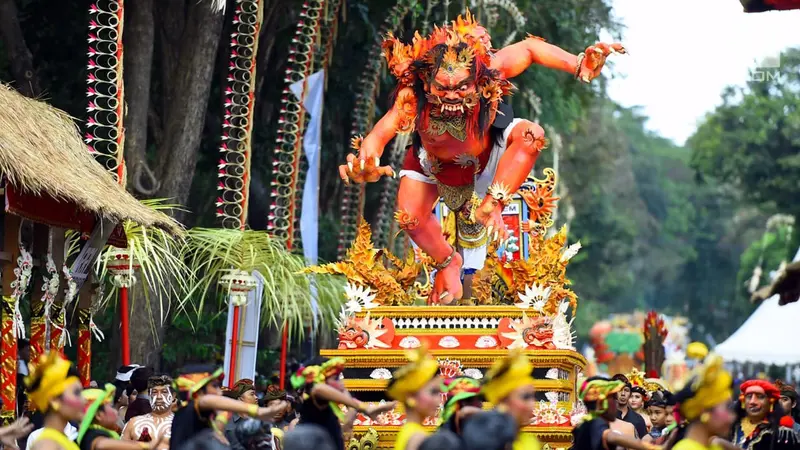
Image Source: bola.comOn the night before Nyepi, locals hold the Ogoh-Ogoh parade, where giant papier-mâché effigies of demonic figures are paraded through the streets. This lively procession is accompanied by traditional music and ends with burning the Ogoh-Ogoh to symbolize the eradication of negative energies and to prepare a purified environment for Nyepi.
Nyepi Day (Catur Brata Penyepian)
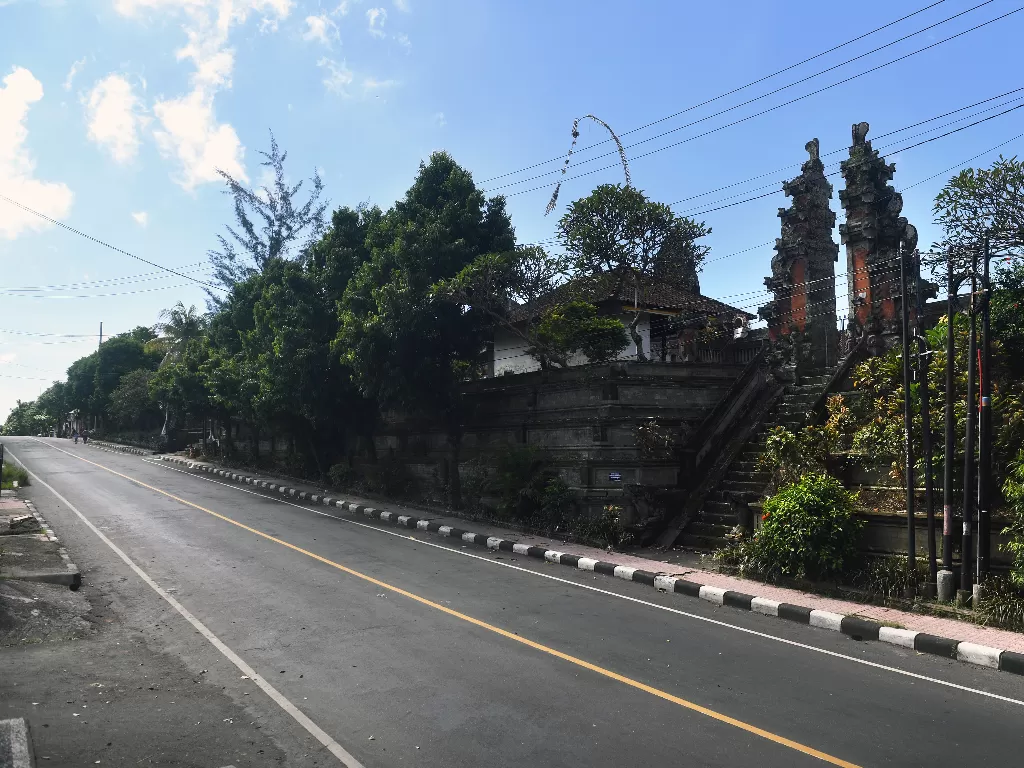
Image Source: news.indozone.idOn Nyepi Day, for 24 hours, Balinese Hindus observe four fundamental restrictions known as Catur Brata Penyepian:
- Amati Geni: Refraining from lighting fires or using electricity.
- Amati Karya: Avoiding work or physical activities.
- Amati Lelunganan: Prohibiting travel or leaving home.
- Amati Lelanguan: Abstaining from entertainment and leisure.
During this period, all activities across Bali come to a complete halt. Streets are empty, businesses are closed, and the airport is non-operational. Tourists are advised to remain within their accommodations, respecting the silence and spiritual practices as part of preparing for Nyepi.
Ngembak Geni (The Day After Nyepi)

Image Source: froyonion.com
The day after Nyepi is called Ngembak Geni, when daily activities resume. Balinese people use this time to visit relatives and neighbors, seeking forgiveness and strengthening social bonds. For tourists, this day presents a perfect opportunity to explore Bali once again after the serene silence of Nyepi Day.
Frequently Asked Questions About Nyepi Day
What is the Atmosphere Like in Bali During Nyepi?
During Nyepi, the entire island of Bali enters a period of complete silence. Streets are empty, airports and ports are closed, and all businesses cease operations. Tourists are expected to remain within their accommodations and respect the local tradition by not going outside or creating noise.
Are Tourists Allowed to Go Outside During Nyepi?
No, tourists are required to stay within their accommodation premises throughout Nyepi Day. Leaving the property or being in public spaces is strictly prohibited and is considered disrespectful to local customs.
Consequences of Going Outside During Nyepi
Anyone who violates the rules by going outside during Nyepi may face traditional sanctions. Offenders might be detained by the local community security (known as Pecalang) until the following day and required to perform community service, such as cleaning temple grounds.
Strict Rules to Follow During Nyepi
During Nyepi Day, all activities in Bali are suspended for 24 hours. The rules apply not only to Hindu residents but to everyone on the island, including tourists. The objective is to create a serene environment for introspection and spiritual purification.
The Four Main Rules (Catur Brata Penyepian) of Nyepi
The four prohibitions observed during Nyepi are known as Catur Brata Penyepian:
- Amati Geni: Refrain from lighting fires, including electricity.
- Amati Karya: Refrain from engaging in physical activities or work.
- Amati Lelunganan: Refrain from traveling or leaving home.
- Amati Lelanguan: Refrain from seeking entertainment or pleasure.
These prohibitions aim to encourage self-reflection and inner peace.
Do Airports and Public Transportation Operate During Nyepi?
No, Ngurah Rai International Airport and all public transportation services in Bali cease operations for 24 hours during Nyepi. It is essential to plan your travel schedule accordingly to avoid inconveniences.
Will Internet and Electricity Remain Available During Nyepi?
Electricity generally remains available during Nyepi, but lights should be kept to a minimum in accordance with Amati Geni. Some internet providers may temporarily suspend their services during this period, so it’s advisable to prepare for this possibility.
Nyepi, also known as the “Day of Silence,” is the Balinese Hindu New Year celebrated annually in Bali. On this day, the entire island observes a 24-hour period of complete silence and inactivity, during which all activities are halted, including the operation of airports and transportation services. Tourists are expected to remain within their accommodations and respect local traditions. Nyepi serves as a time for reflection and self-purification, aiming to achieve balance and harmony between humans and nature.

